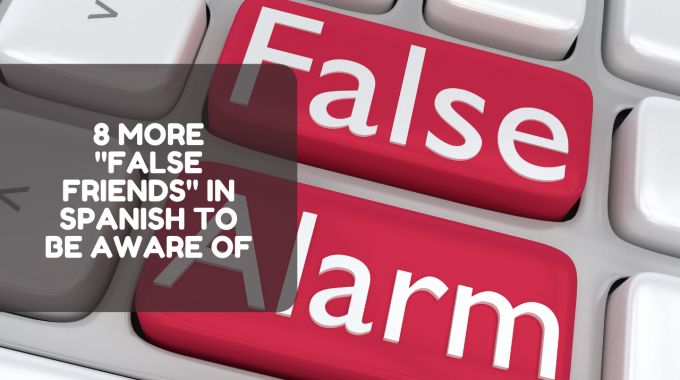Learning a new language is a challenging yet rewarding experience. In our increasingly globalized world,…

8 More “False Friends” in Spanish To Be Aware Of
“False friends”, also known as “false cognates”, are words in two languages that look similar but have completely different meanings. English and Spanish have a lot of “false friends”, which makes learning the Spanish language a bit challenging, yet entertaining, for English speakers.
If you haven’t taken a look at our last article on “false friends” in Spanish, click here to have a read!
This week, we bring you eight more “false friends” in Spanish. Although these words won’t get you in trouble if used incorrectly, they will certainly confuse the Spanish-speakers you’re speaking to. So, it’s better to learn them correctly ahead of time!
1) Carpeta
What you may think it means: Carpet
What it actually means: Folder

Imagine your dog urinated on your carpet and you need to give it a good wash. Don’t say, “Mi perro orinó en la carpeta, necesito lavarla.” In most cases, people will just say “yuck”, and tell you to throw that folder away!
If you want to say “carpet” in Spanish, use the word “alfombra”.
2) Pie
What you may think it means: Pie
What it actually means: Foot
You go to a café with some friends and you want to order a pie. Do not say, “Me gustaria pedir un pie,” unless you want to order a foot! The pronunciation in English and Spanish for “pie” is quite different though. If you pronounce it the English way, Spanish speakers would probably have no idea what you’re talking about.
To order a pie, say instead, “Me gustaria pedir un pastel.”
3) Fábrica
What you may think it means: Fabric
What it actually means: Factory

Let’s say you’re working on a new project to make your own clothes and you need to buy fabric. You go to the fabric store and say, “Quiero comprar una fábrica.” You just told the vendor that you want to buy a factory! This may help with your new clothes-making venture, but you probably didn’t want to take it that far and own an entire factory.
To say “fabric”, the word in Spanish is “tela”.
4) Recordar
What you may think it means: To record
What it actually means: To remember

Something exciting is happening and you ask your friend to give you her camera so you can record it. Don’t say, “Dame tu cámara para recordar este momento.” I mean, that phrase still makes sense because by recording, you will be remembering the moment.
However, if you want to say “record” in Spanish, the word is “grabar”.
5) Pan
What you may think it means: Pan
What it actually means: Bread
If you’re shopping for a pan to fry eggs, asking the salesman, “Donde puedo conseguir un pan para freír huevos?”, he may look at you in a confused manner and think you’re asking for what kind of bread goes best with fried eggs.
“Pan” in Spanish is ‘sartén’.
6) Enviar
What you may think it means: To envy
What it actually means: To send

Imagine your Spanish-speaking friend just won a trip to Mexico and you want to express your envy. Don’t say “Te envio mucho!” Your friend may ask you what you’re planning to send him, money perhaps?
Instead, you can say “Te envidio mucho!” to let him know that you envy him very much.
7) Atender
What you may think it means: To attend
What it actually means: To serve
There’s a new event in town that you want to attend. If you say “Quiero atender a este evento!”, you may have just signed yourself up for some volunteer work!
In Spanish, “to attend” is “asistir” (which you may think means “to assist”…let the confusion continue). So you should say, “Quiero asistir a este evento!”
8) Sopa
What you may think it means: Soap
What it actually means: Soup
Imagine you’re in a restaurant and the bathroom is out of soap. Do not say to the waitress, “El baño necesita más sopa,” unless you want to have some soup in the washroom!
“Soap” in Spanish is “jabon”.
If you’re a native English speaker learning Spanish, you’ll come across tons of “false friends” that can make your language learning experience a bit frustrating, but you’ll always get a good laugh out of it!
If you know any more false cognates in Spanish and English, feel free to share them in the comments below!



